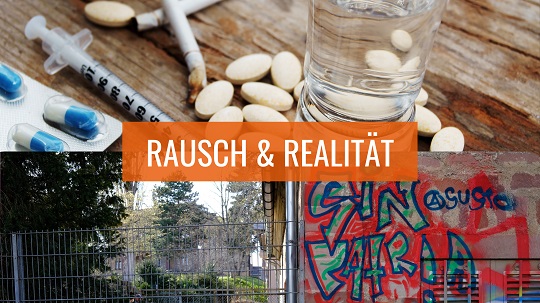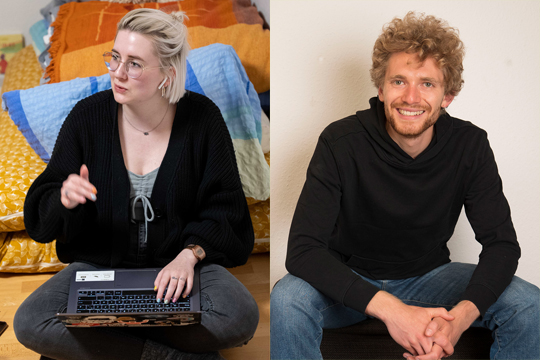Student cross-media project
Freiburg, May 10, 2021
“Rush and Reality”: In April 2021 a team of eleven students of uniCROSS, the cross-media student editorial team at the University Library Media Centre, published articles on the topic of drugs with a wide range of content on various media channels. The centerpiece is a 36-minute video report on the open drug scene in Freiburg’s Colombipark. Vinetta Richter and Thomas Hermanns work as tutors at uniCROSS. In an interview with Anita Rüffer, they talk about what sparked the project, which has met with great resonance from those involved.

Drug room, drug addiction, brain doping: the student editors of uniCROSS have looked into the many facets of the topic "drugs". Collage: Vinetta Richter/Thomas Hermanns/uniCROSS
Was there a particular reason you chose to address this subject?
Thomas Hermanns: I live very close to the Colombipark and walk past the obvious drug scene there every day. I noticed this strange separation in the park: on the one hand, flower beds and benches around the museum in the Colombischlössle, on the other hand, the demarcated area for the drug scene.
Vinetta Richter: The scene is right in the middle of the city, which no one can really ignore. But like most of the public, I knew nothing about it. Who are these people? What do they do? We became curious about their stories.
How easy was it to come into contact with them?
Hermanns: At first, we weren’t sure how to approach them so we contacted a social worker from the Freiburg drug help center and the contact network for street social work in the city of Freiburg. Together we then went to the demarcated area. We didn’t know what would come out of it. But the people there were very open.
Richter: I didn’t expect that, and I was pleasantly surprised. In the video, we let two of the protagonists have their say for more than 15 minutes.
Isn't that a bit long from a journalistic perspective?
Richter: No. But drug addicts have no lobby. In the report, it was important for us to let them talk a lot themselves and not talk about them. Our aim is to create emotional proximity and to counter the pigeonholes into which they are all too quickly put with their own reality. In the process, it becomes clear that drug addiction is a disease. Those who are affected by drug addiction must be taken care of by society.
 Vinetta Richter and Thomas Hermanns work as tutors at uniCROSS and supervised the student project. Photos: Thomas Hermanns
Vinetta Richter and Thomas Hermanns work as tutors at uniCROSS and supervised the student project. Photos: Thomas Hermanns
Are drug addicts to be seen as just victims or do they also have a responsibility for their lives?
Hermanns: It is not that simple. Of course, everyone bears responsibility for their own lives. But the paths to addiction are as different as the people who take them. But the way out is complicated. Most people know people who are addicted to nicotine and are trying to quit smoking. And you know how hard that is. With hard drugs like heroin, withdrawal is even harder. And that’s the problem. Here, addicts are trampled on and ostracized by society. Our theme week shows that black-and-white thinking does not do the reality of it justice.
What is the reality of it then?
Richter: In Basel, for example, research is being conducted about the extent to which psychedelic drugs such as LSD or mushrooms can be used in the therapy of depression or anxiety disorders. In this country, such healing research would not be possible at all, because they are considered illegal substances, as you can read in an article within the framework of our project. An interview with a senior physician explores the question of how widespread drug addiction is among medical personnel. Students also turn to drugs to boost their concentration and performance: a law student talks about Ritalin as brain doping in an interview.
In your video, you make a strong case for a drug room in Freiburg. Why?
Hermanns: Because there is a need for it. The concept of a drug room is not new. It has been used successfully for decades in Switzerland and several German cities. Selina Trinkner from the Freiburg drug help center made the advantages clear to us. For one thing, no one wants people to consume in public spaces, neither those affected by drug addiction nor passers-by. So the public space is spared. On the other hand, the risks of consumption are also reduced.
Doesn't such an offer create incentives to use drugs in the first place?
Hermanns: It would certainly not occur to anyone to simply go there and start up a drug habit. The causes of drug addiction lie elsewhere. Assistance programs such as a drug room, the drop-in center with syringe exchange or methadone substitution aim to reduce symptoms and the need to obtain money, and thus to reduce drug-related crime. Examples from other countries such as Switzerland or Portugal show that acceptance-oriented measures are more successful than repression.
Richter: A lot still needs to change in the way we deal with drugs. Our theme week offers the opportunity to get an overview of the various aspects involved.

